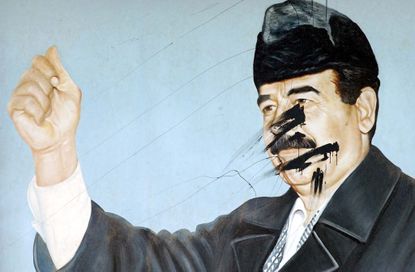The deep, perverse relationship between Middle Eastern despots and Islamist fanaticism
The fight against ISIS is not nearly as straightforward as many Western leaders claim


It's time to wake up to the deep, perverse relationship between secular despotism and Islamist fanaticism.
The proof stretches back clear to Saddam Hussein, who tapped into the deranged spirit of suicidal jihad more than many would care to recall. Abu Nadil, the ISIS leader U.S. airstrikes recently obliterated, was not just known to the West as the likely spokesghoul infamous from a videotaped beheading of Coptic Christians held in February of this year. He was also an FRL, a.k.a Former Regime Loyalist: a Baathist holdover turned ISIS governor of the Iraqi province containing — surprise, surprise — Saddam's hometown.
"ISIS's roots in Saddam Hussein's Baath Party are deep — many of the group's most devoted commanders, advisers, and fighters started out as Baathists," as clandestine anti-jihad veteran Malcolm W. Nance has patiently explained. "The ex-Baathists essentially run ISIS, and their past is evident in the tactics they are using now."
Subscribe to The Week
Escape your echo chamber. Get the facts behind the news, plus analysis from multiple perspectives.

Sign up for The Week's Free Newsletters
From our morning news briefing to a weekly Good News Newsletter, get the best of The Week delivered directly to your inbox.
From our morning news briefing to a weekly Good News Newsletter, get the best of The Week delivered directly to your inbox.
The intimate link between despotism and caliphism reaches well beyond Iraq. It is the central feature of life in Syria — where Bashar al-Assad and the Islamic State serve one another's ends — and in Lebanon, where Hezbollah has happily cultivated and exploited the deepest of ties with the Assad regime. Syrian rebels, including defectors from Assad's decaying army, have warned of an Invasion of the Body Snatchers-style transformation of the ostensibly state military, with Hezbollah and Iranian parasites filling and animating the body of the host.
As Assad's once relatively secular dictatorship grows more caliphist, the complementary inverse procedure accelerates just across the "border." In a development Reuters rather naively described as an "unexpected twist," Suleiman Franjieh, childhood friend of Assad himself, is deftly positioned to assume the presidency of Lebanon. "Hezbollah has repeatedly stated its support for the candidacy of [Michel] Aoun, 80, its ally since 2006 and head of the biggest Christian bloc in parliament," Reuters noted. "Yet Franjieh, whose ties to the group are much older, may be a preferable choice for the group as Hezbollah wages war in Syria in support of Assad." You bet your Baath he is.
In one of the more worrying hallmarks of naivety and willful ignorance in the West, Hezbollah's possible complicity in what are presumably Islamic State attacks has failed to show up as even a blip on our busy matrix of fear. (Of course, Hezbollah denounces ISIS as vociferously as Assad, to the scripted delight of, among others, Russia.) But it is Hezbollah that has laid down the tried-and-true blueprint for supposedly "calculating" and "pragmatic" strongmen who know well the value, and danger, of nursing vipers. It is now obvious that Tunisia is being primed by the Islamic State to become Libya's own Lebanon. Thousands of Tunisians have joined ISIS, fanning out across Libya and the Levant alike, with the group's leadership openly calling on more maniacs to indulge their whims. One report puts their number at 6,000, beating out even the granddaddy of absolutist jihad-mongers, Saudi Arabia, for top honors in the world ISIS recruitment finals.
Those who wish to portray our era's marquee conflict as a clash of civilizations may be overstating the case. But at least they are groping toward a way of admitting that mass-murdering illiberalism in the Muslim world cannot be reduced to one kind of worldview or another. Islamism's deranged true believers have long been in league with its least spiritualistic worshippers of raw, unfettered power.
Reasonable as it is for us to try reducing this vile mass to a single dimension, that would be a fatal error. However much a part of the problem Islamism may be, an extreme version of this faith cannot singlehandedly account for the cannibalization of civilization in the Middle East. Civilizations are more complicated than that. Unfortunately for Western civilization, so are the perils we would love so much to reduce down to ISIS alone.
Sign up for Today's Best Articles in your inbox
A free daily email with the biggest news stories of the day – and the best features from TheWeek.com
James Poulos is a contributing editor at National Affairs and the author of The Art of Being Free, out January 17 from St. Martin's Press. He has written on freedom and the politics of the future for publications ranging from The Federalist to Foreign Policy and from Good to Vice. He fronts the band Night Years in Los Angeles, where he lives with his son.
-
 4 ways to give back this holiday season
4 ways to give back this holiday seasonThe Explainer If your budget is feeling squeezed, remember that money is not the only way you can be generous around the holidays
By Becca Stanek, The Week US Published
-
 4 tips for hosting an ecofriendly Thanksgiving
4 tips for hosting an ecofriendly ThanksgivingThe Week Recommends Coming together for the holidays typically produces a ton of waste, but with proper preparation, you can have an environmentally friendly gathering.
By Theara Coleman, The Week US Published
-
 Jussie Smollet conviction overturned on appeal
Jussie Smollet conviction overturned on appealSpeed Read The Illinois Supreme Court overturned the actor's conviction on charges of staging a racist and homophobic attack against himself in 2019
By Peter Weber, The Week US Published
-
 Late night hosts lightly try to square the GOP's Liz Cheney purge with its avowed hatred of 'cancel culture'
Late night hosts lightly try to square the GOP's Liz Cheney purge with its avowed hatred of 'cancel culture'Speed Read
By Peter Weber Last updated
-
 Late night hosts survey the creative ways America is encouraging COVID-19 vaccinations, cure 'Foxitis'
Late night hosts survey the creative ways America is encouraging COVID-19 vaccinations, cure 'Foxitis'Speed Read
By Peter Weber Published
-
 The Daily Show's Trevor Noah carefully steps through the Israel-Palestine minefield to an 'honest question'
The Daily Show's Trevor Noah carefully steps through the Israel-Palestine minefield to an 'honest question'Speed Read
By Peter Weber Last updated
-
 Late night hosts roast Medina Spirit's juicing scandal, 'cancel culture,' and Trump calling a horse a 'junky'
Late night hosts roast Medina Spirit's juicing scandal, 'cancel culture,' and Trump calling a horse a 'junky'Speed Read
By Peter Weber Last updated
-
 John Oliver tries to explain Black hair to fellow white people
John Oliver tries to explain Black hair to fellow white peopleSpeed Read
By Peter Weber Published
-
 Late night hosts explain the Trump GOP's Liz Cheney purge, mock Caitlyn Jenner's hangar pains
Late night hosts explain the Trump GOP's Liz Cheney purge, mock Caitlyn Jenner's hangar painsSpeed Read
By Peter Weber Published
-
 Late night hosts marvel at that photo of the Bidens and Jimmy and Rosalynn Carter, mark Star Wars Day
Late night hosts marvel at that photo of the Bidens and Jimmy and Rosalynn Carter, mark Star Wars DaySpeed Read
By Peter Weber Published
-
 Late night hosts temper America's new surge of optimism, hit Romney's rough reception, Flynn's Pledge fail
Late night hosts temper America's new surge of optimism, hit Romney's rough reception, Flynn's Pledge failSpeed Read
By Peter Weber Published